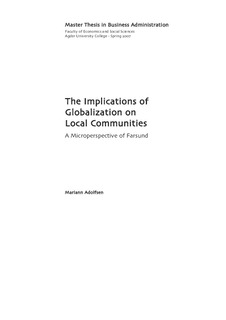The Implications of Globalization on Local Communities - A Microperspective of Farsund
Master thesis
Permanent lenke
http://hdl.handle.net/11250/135412Utgivelsesdato
2007Metadata
Vis full innførselSamlinger
Sammendrag
This thesis explores the impact globalization has on local communities. Farsund, a Norwegian
town with approximately 9500 inhabitants, is studied in depth and conclusions are based on
this specific community.
Personal in-depth interviews are accomplished with four groups of representatives in Farsund.
These four groups include representatives for employees, representatives for farmers,
representatives for Norwegian companies, and representatives for international companies.
The interview guide is based on a model, which combines four units of free flow with five
controversies in the globalization theory. The four units of free flow are information and
research, investments and capital, products and services, and people (labor). The five
controversies are culture, politic, economy, security and equality. Additionally, barriers are
discussed in relation to the four units of free flow.
An interesting finding in this thesis, is that the view on globalization depends on which group
one belongs to in the local community. The representatives for the employees, Norwegian
companies and international companies argue that increased globalization has positive
consequences for them. The farmers, however, believe increased globalization has negative
consequences for them. The general conclusion is that globalization has an overall positive
impact on local communities, even though globalization also has its disadvantages such as
less power to local authorities and the risk that local communities will vanish.
Beskrivelse
Masteroppgave i økonomi og administrasjon 2007 - Høgskolen i Agder, Kristiansand
Utgiver
Høgskolen i AgderAgder University College
